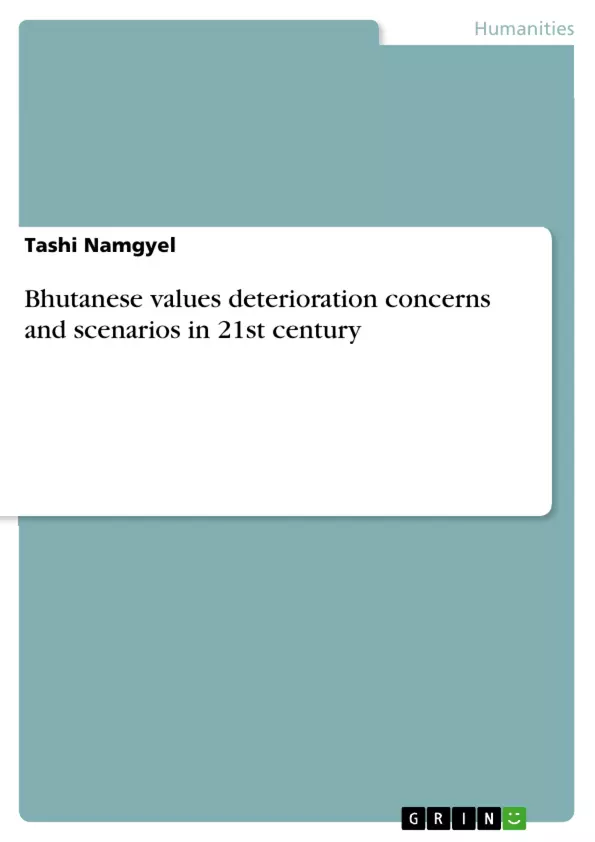This qualitative phenomenology study focuses Yechen Central Central School teachers and students, and adjacent local communities practice values and concern deterioration through extensive review of literature. Semi-structured interviews are used to gather data from four students, four teacher, and four students’ parents. Also the data of disguised observations carried further substantiated values deterioration concerns and scenarios. In the findings sensed that inherited Bhutanese values still prevail, of few are ignorant at taking care of parents and other elderly; give less attention to relationship and brotherhood followed by family separation, too much engrossment in smart phones, national dresses worn only in occasions and office times; many disregard folk tales, riddles, simple steps and lyrics of folk songs. In conclusion recommends general public to give sincere thought to initiate common forums to discuss and revive disappearing values.
Inhaltsverzeichnis (Table of Contents)
- Introduction
- Literature review
- Values identification
- Values' significances
- Bhutanese values and deterioration concerns
- Worldwide discussion on values
- Methodology
- Findings
- Ascertaining as values..
- Inherited Bhutanese values.
- Bhutanese values deterioration causes.
- Values deterioration concerns and scenarios.
- Discussion
- Recommendation
- Conclusion
- Reference
Zielsetzung und Themenschwerpunkte (Objectives and Key Themes)
This phenomenological study aims to investigate the deterioration of values in the communities of Bhutan by examining the practices and concerns regarding values among teachers, students, and local communities in a central school and its surrounding areas. The study utilizes semi-structured interviews and disguised observations to gather data and assess the prevalence of traditional Bhutanese values and identify the causes and scenarios of their deterioration.
- The preservation and decline of traditional Bhutanese values
- The impact of globalization and modernization on values
- The role of education in shaping values and addressing concerns
- The relationship between values and social harmony and well-being
- The importance of community involvement and cultural preservation
Zusammenfassung der Kapitel (Chapter Summaries)
- Introduction: Introduces the topic of Bhutanese values, highlighting the researcher's observations of their deterioration. Presents examples of traditional values and behaviors, as well as concerns regarding their decline.
- Literature review: This section examines existing research and literature on values, encompassing their identification, significance, and the challenges they face. It explores different perspectives on values from various scholars and sources.
- Methodology: This section outlines the research methods employed in the study, including semi-structured interviews and disguised observations. It details the participant selection and data collection techniques used to gather insights on values deterioration.
- Findings: This section presents the findings of the study, highlighting the presence and prevalence of traditional Bhutanese values. It also discusses the causes identified for values deterioration and outlines the scenarios observed in the communities.
- Discussion: This section analyzes the findings of the study, connecting them to existing literature and broader societal contexts. It discusses the implications of values deterioration for individuals and communities, and explores potential solutions.
Schlüsselwörter (Keywords)
This study focuses on the deterioration of Bhutanese values in the 21st century. It explores key concepts such as traditional values, globalization, modernization, education, social harmony, community involvement, and cultural preservation. The research investigates the impact of these factors on the prevalence and sustainability of values in Bhutanese communities.
- Quote paper
- Tashi Namgyel (Author), 2018, Bhutanese values deterioration concerns and scenarios in 21st century, Munich, GRIN Verlag, https://www.grin.com/document/388255



